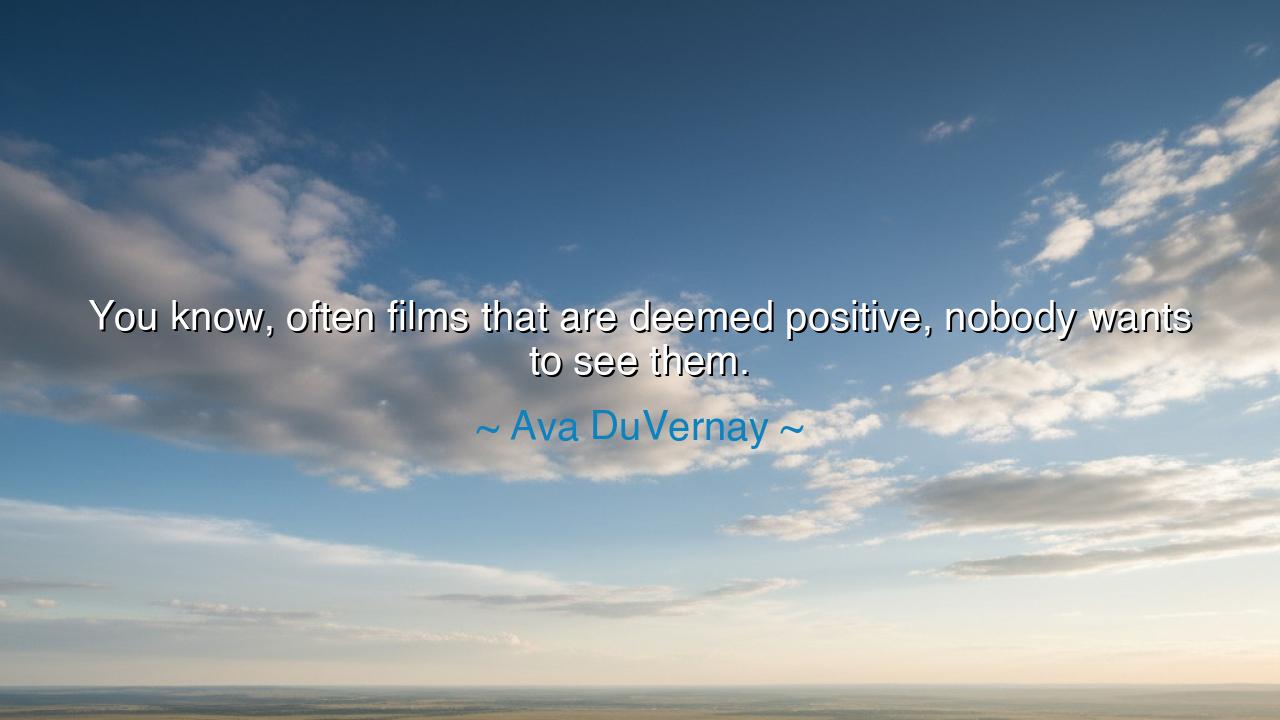
You know, often films that are deemed positive, nobody wants to






The words of Ava DuVernay—“You know, often films that are deemed positive, nobody wants to see them.”—strike at the heart of human appetite for story. In them lies both lament and revelation. She reminds us that though we say we yearn for light, too often our eyes are drawn to shadows. Though we praise hope and virtue, our curiosity is captured by conflict, tragedy, and scandal. What she names is not only a truth about cinema, but about the human condition: that the soul is restless, often preferring turbulence over serenity, spectacle over stillness, and dark drama over quiet truth.
The ancients knew this paradox well. The Greek playwrights filled their amphitheaters not with tales of simple joy, but with tragedies where kings fell, families shattered, and gods punished mortals with merciless fate. Crowds flocked to these stories, even though they broke hearts. Why? Because in the depths of sorrow, men and women felt catharsis—a cleansing of the soul through shared pain. DuVernay’s words echo this timeless reality: works branded as positive often lack the tension that audiences unconsciously crave, and thus they are overlooked, though their intent is noble.
History, too, bears witness. Consider Charles Dickens. His works, while ultimately hopeful, were not embraced merely for their cheer. They endured because he did not shy from exposing cruelty, poverty, and injustice. The sweetness of his endings had weight because they emerged from suffering. Audiences did not flock to him for positivity alone, but for the balance of darkness and light. In this we see the truth of DuVernay’s lament: people rarely gather for unbroken light, but for stories that reflect the whole of reality—the bitter and the sweet, the wound and the healing.
DuVernay’s words also reveal the weight carried by artists. To create something positive—a work that uplifts and dignifies—often feels like shouting against the wind of an audience hungry for spectacle. Yet her acknowledgment of this truth is not surrender, but resolve. For to know that light is harder to sell is to make its creation even more urgent. The artist who persists in telling uplifting stories fights not only the market but the deeper human tendency to glorify darkness over hope.
The wisdom here is not that positivity is weak, but that it is rare, and thus requires courage. Light has less spectacle than fire, but it nourishes more deeply. Audiences may resist it, but souls need it. Just as the farmer plants grain when the people clamor for feasts of sugar, so too the artist must create positive stories even when the world prefers tragedy. The true measure of art is not popularity alone, but the nourishment it provides for the human spirit.
The lesson for us is clear: in life as in art, do not turn away from the positive simply because it does not glitter with drama. Seek out stories, experiences, and people who uplift, even when they seem less exciting. And when you create—whether in words, deeds, or daily living—do not fear if your light draws fewer crowds. Remember that truth and goodness, though less sensational, are more enduring.
So, dear listener, let Ava DuVernay’s words be both a challenge and a call. Recognize the world’s thirst for spectacle, but do not be captive to it. Support works that bring dignity, hope, and compassion, even when they are not popular. And in your own journey, strive to live a story that is positive, even if fewer watch, for the true audience is not the crowd, but the generations yet to come. For while darkness entertains, only light sustains.






PUTran Phuong Uyen
This statement raises a question about the perception of ‘positive’ content. Is it that audiences avoid positive films because they seem predictable or didactic, or is there a deeper cultural bias against optimism in storytelling? I also think about the psychological aspect—do people sometimes resist positivity in media when seeking catharsis or reflection of real-world struggles? Exploring this tension could help creators understand how to make meaningful, uplifting films resonate without compromising authenticity or depth.
NNgthanhhoa
I’m struck by the implication that good intentions in filmmaking don’t guarantee popularity. Does this reveal something about human preference for drama and complexity over straightforward positivity? I also wonder how cultural context affects reception—are some societies more receptive to uplifting content than others? Additionally, how can filmmakers create positive films that are engaging, dynamic, and commercially viable, rather than sacrificing quality or moral intent for mass appeal?
GLNguyen Hoang Gia Long
This quote prompts reflection on the role of storytelling and audience psychology. Why might positivity in film feel less compelling or urgent than darker or more sensational narratives? I wonder if part of it has to do with marketing strategies that emphasize conflict and tension, overshadowing the value of hope and inspiration. Could educational campaigns or targeted promotions help audiences recognize the appeal and relevance of films with positive messages, potentially reshaping viewing habits?
ATNguyen Anh Thu
Reading this makes me think about the balance between art and commerce. Are positive films underappreciated because they challenge viewers or demand emotional engagement rather than offering easy thrills? I also question whether societal values and cultural attitudes play a role—are audiences conditioned to expect conflict, drama, or sensationalism as the norm in cinema? Could this dynamic discourage filmmakers from producing genuinely uplifting content, fearing limited financial returns despite artistic merit?
NTLuong Nguyen Thi
I find this observation frustrating but relatable. Does it suggest that people inherently avoid uplifting or thought-provoking films because they perceive them as less exciting? How much of the issue lies in audience preference versus how studios promote these films? I also wonder if the rise of streaming platforms and niche audiences could change this trend, allowing positive films to find dedicated viewers even if they don’t dominate mainstream box office charts.